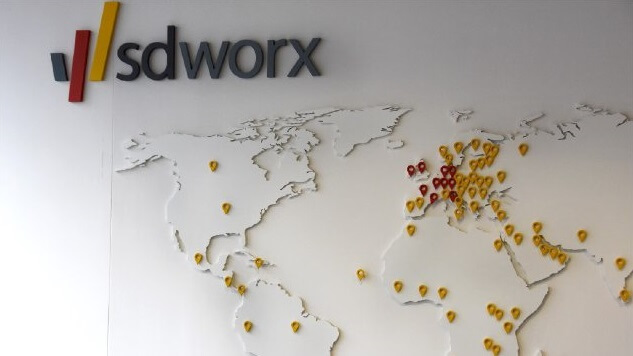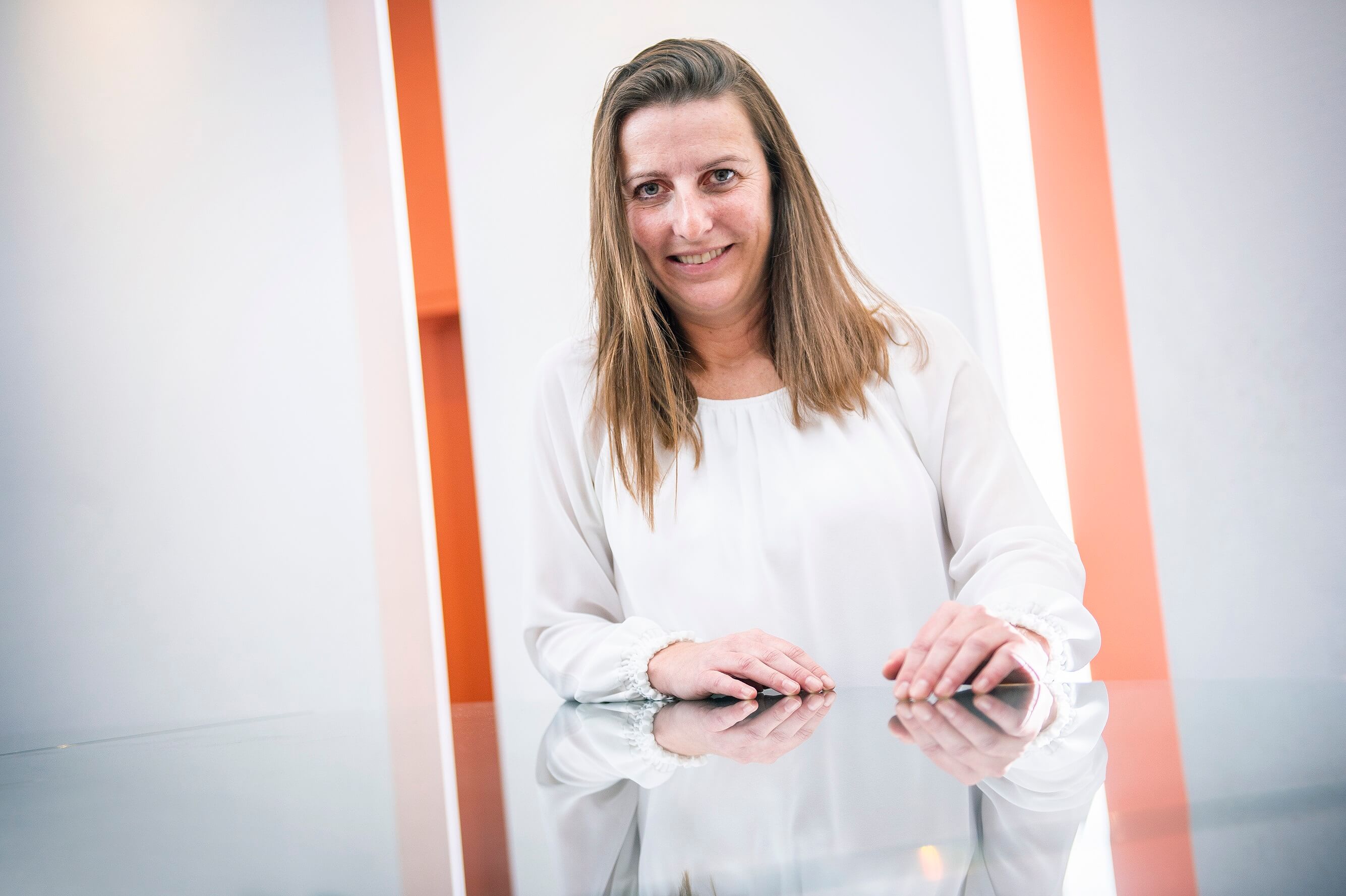Enjoying the steep learning curves of Finance
In the run-up to the corporate sessions of our Leave Your Mark career talks, we interviewed Nadine Aerts, CFO of HR service provider SD Worx, about her career path.
As the sponsor of the AMS Chair Sustainable careers, held by professor Ans De Vos, the company has a prominent voice in the public debate on careers.
Nadine swears by values like autonomy, freedom, and integrity. ‘Give me freedom,’ she says, ‘ and my productivity will increase enormously. Put me in a straitjacket and I feel inhibited.’ Once she wanted to be the youngest woman on the executive committee, now she says she first and foremost wants to have fun in her job. And that fun is to be found in Finance.
Nadine Aerts has been CFO of HR service provider SD Worx since 2019, initially of the Staffing & Career Solutions engine, later also of the People Solutions engine, SD Worx’s international payroll, software, consultancy and HR outsourcing services branch.
Nadine started her career in 2000 as an IT implementation consultant at a small consulting company and later as a business analyst at Toyota. Through a friend, she ended up at SD Worx where she worked as a business analyst in Finance.

Autonomy, Freedom, and Integrity
Her career path at the company is varied. At the time SD Worx wanted to set up a new company in the Netherlands, Nadine was asked to find out which financial system should be set up. When the focus shifted from setting up shop to acquisitions, CFO Hector Vermeersch asked her if she could immediately put into practice the knowledge about acquisitions and due diligence she was still acquiring in an MBA course.
More acquisitions followed, all supervised by Nadine at Finance. At one point, she was made responsible for the Flex Income Plan (strategy, sales, product development, implementation of a flexible remuneration system). Returning to Finance as Head of Specialized Finance, she became responsible for strategic projects, risk management, and tax. Barely mid-career, she is now the company’s CFO, swearing by values such as autonomy, freedom, and integrity.
Big Hairy Audacious Goal
How actively have you thought about your career in recent years?
Nadine Aerts: ‘In my entire career, there has been one moment of self-reflection at which I consciously thought about my career path. Just after obtaining my MBA, I made a BHAG, a Big Hairy Audacious Goal. At the time that Harold Ryckaert and Tom Wouters joined the executive committee at a fairly young age, I wanted to become the youngest woman ever on the executive committee. But to get there, I needed more and better knowledge of the company’s business. So I joined the Consulting Division to manage the Flex Income Plan team.
‘It was a difficult time for me. There stood my BHAG, Big and Hairy and Audacious, and logic dictated that I take up my role to realize it. The problem was: my job in the business made me unhappy. I definitely enjoyed Finance more. Because I mainly wanted to have fun at work, I left my BHAG for what it was and returned to Finance to work on acquisitions again, but in a different role with a focus on major strategic projects. I also resolved finance-related discussions between business units, a role in which I enjoyed myself incredibly. En cours de route, the role took on a somewhat more formal character and grew into a real function that was called ‘Specialized Finance’, to which Risk Management, Tax and Treasury were also added.
‘At the end of 2015, CFO Hector Vermeersch asked me out of the blue if I wanted to be his successor. For several reasons, I had never considered becoming a CFO: I had never worked at the Big Four; I knew little about accounting or financial controlling because I have taken on less-prototypical Finance roles - and the board did not really know me either. But Hector introduced me there and I became a member of the strategic committee. Then, the company started the succession process for Hector, in which I was included but not chosen because I had too little international experience.

Turning 40: 'Where are you heading?'
‘Six months after Hector's successor had started, I started to wonder where I really wanted to go. At first glance, it was no longer possible to become a CFO. I had turned forty and thought I really should have a plan. Coincidentally, a friend who had always worked in Finance crossed my path. She trained as a personal coach and was looking for an object of study and I agreed to have a few conversations with her about my career.
‘Suddenly, things went very fast. When the CFO of our staffing business left in April 2019, I was asked to succeed him, which led to me becoming the CFO of SD Worx Staffing & Career Solutions business in the Summer of 2019. At the end of the year, the new CEO of SD Worx People Solutions asked if I still wanted to become CFO of the other business, to which I answered rather voluntaristically and perhaps a little naively that I might be able to combine both roles.
‘It might have sounded a bit naive. The pipelines of both Finance departments contained many projects, such as an SAP go-live, an Operational Excellence project within Finance of People Solutions, an effort to raise the Finance department's maturity level in Staffing Solutions, or organizational change within People Solutions. And then I’m not even speaking about the Covid-19 impact.'
Give me freedom and my productivity will increase enormously. Put me in a straitjacket and I feel inhibited
Nadine Aerts, CFO SD Worx
Connecting in terms of character and integrity
Hector Vermeersch’s name has been mentioned a few times. Was he your mentor?
Nadine Aerts: ‘Absolutely! Thinking about it, I have actually had three mentors, but Hector is by far my number-One mentor. I learned the most from him. As a person, he connects with me in terms of character and integrity. He is very no-nonsense, has no hidden agenda. My personality as a professional has largely been shaped by him. Not that he directed me in any particular direction, except when he asked me to become his successor, but in the sense that he taught me to think out-of-the-box or, for example, taught me what system-thinking was, a more holistic approach to systems and the chosen processes. I have learned for instance to consider the potential positive and negative consequences, the upsides and the downsides of every decision I make.
‘Until mid-2018, Hector was CFO of SD Worx People Solutions. Since the end of 2017, he is also the CFO of the Holding. Everything I did within Specialized Finance, such as acquisitions, financing, the bonds we issued, investor relations, tax, falls under the holding company. Everything to do with accounting, financial controlling, and business partnering falls within what we call our two engines: People Solutions and Staffing & Career Solutions. SD Worx People Solutions is the international supplier of payroll and HR outsourcing services, software and consultancy. SD Worx Staffing & Career Solutions is the entity that specializes in flexible employment.
‘I am currently combining the last two roles and so I have two “bosses", the CEO of People Solutions Kobe Verdonck and the CEO of Staffing & Career Solutions Christophe Petit.
You need 7 to 9 different impressions of someone before you change your first impression
Nadine Aerts, CFO SD Worx, quoting Kevin Vanoirbeek
The power of mentorship
‘The collaboration with Hector began somewhere in 2006. We worked in a trust-relationship for ten years, gradually starting to work side by side. It was only when he had asked to become his successor in 2015 that, in the context of succession planning, I sometimes took over his role, for example in the Strategic Committee. The transition was fairly gradual. Call it organic growth. At a certain point, the Chairman of the Board started to have one-on-one conversations with me.
‘Hector's mentorship was mainly informal in nature. We didn't really have meetings or an agenda. It mainly concerned substantive conversations. We never discussed things like job satisfaction.
‘It is really important that his management style suits me incredibly well. Give me freedom and my productivity will increase enormously. Put me in a straitjacket and I feel inhibited. For Hector, mentorship consisted primarily in an exchange of views, ideas and suggestions. He didn't need many words for that.
‘A second mentor is Kevin Vanoirbeek, whom I got to know when he started working for us as a consultant in one of the strategic projects I led. Apart from the click that there must be in terms of values and norms, I learned a lot from him about the human aspect, especially about change management: “What are people like? How can you motivate them to change? How important is an impression? When I meet someone for the first time, I often think of a quote from Kevin: “You need 7 to 9 different impressions of someone before you change your first impression.”
Catherine Van Passel is my third mentor and a personal friend. Already 15 years ago, I was in admiration of the career she made in various Finance positions. She was an example for me. As a personal coach, she helped me a lot in making the choices that led to where I am now.

Steep learning curves
Did you experience steep learning curves, times when you thought: ‘Now I really have to gear up?
Nadine Aerts (laughs): ‘At almost any time during my career. I have never had any specific training for any position. Not for the job in M&A, not as a business manager, not for sales. When I started working on acquisitions, I had never done any due diligence. When I became a Business Manager, I had never led a business or made sales calls. I have done the strategic projects at my own discretion. Before I became CFO of SD Worx Staffing & Career Solutions, I may have had three conversations with the previous CFO, although I barely knew that business domain.
‘And as I said: when I became CFO of SD Worx People Solutions, I had never done accounting or financial controlling; I have never followed the budgeting process. It actually started with my first job as an IT implementation consultant. I was actually going to start in a different position, so I missed the training that the other implementation consultant starters had already followed. On my first day at work, I was given a manual with the words: “Voilà, get started!"
‘With every switch I've made, I wondered if I wouldn’t be exposed as a fraud. Apparently, there is a term for this: "The Impostor syndrome" (laughs). (Despite existing external evidence of their competence, people sometimes doubt their skills, talents or performance. They think their success is mainly due to luck or chance and fear that they will be exposed as fake by their environment. Editorial note)
‘Actually, this is the story of the cat that always lands on its feet,’ SD Worx career expert Jan Laurijssen adds. ‘It calls into question the idea that you need job-specific training for a large number of jobs. That is less and less the case. For certain professions, you naturally need specific qualifications. We are happy that doctors, firefighters, or builders have received training. But in business you first and foremost need a "can do" mentality. If other people think you can take on a certain job or role, then grab your chance. In a career, it often happens that certain people throw a bone at you. You just take it, and you run with it.'
Consultation as a remedy against failure
Have you ever failed completely and drawn conclusions from it? Ever made a wrong choice?
Nadine Aerts: ‘I don't think I've ever failed. When I worked in the business, I realized that was not really my strength. I also noticed that I get energy when I see results that are directly related to my input. Within Finance you perform a number of tasks, and the output is a good report, for example.
‘When I was responsible for the Flex Income Plan on the business side, I had 170 prospects divided between myself and a sales colleague. We are talking 2009. We were at the peak of the financial crisis. Everyone was interested in the Flex Income Plan, but no one had a budget. The conversations were all great; but there was no way I would have reached my target, which frustrated me a lot. Is that failure? I do not know. In hindsight, it was a phase in my career that I was not happy with. I learned a lot about business, but I don't know if I would make that choice again.
‘One of my strengths is that I often exchange thoughts and consult with other people, what I think is a good remedy against failure. In my current position, I often work with long-time veterans in Finance who know better than I how to do something. I just deliberate with them. And what I certainly don't do is pretend I know something while I actually don’t. I tend to be honest about not knowing things. That should reduce the chance of failure.'
I get energy when I see results that are directly related to my input
Nadine Aerts, CFO SD Worx
The prototypical path to becoming a CFO
Is there such a thing as a prototypical path to becoming a CFO?
Nadine Aerts: "Yes. The best education I think you can have is a broad education such as Applied Economics, Business Engineering or Business Administration. You have to be able to go broad and yet have an affinity with Finance. I also advise aspiring CFOs to master the basics of accounting for three to five years at the Big Four. I didn't, but if I could start over, I definitely would. Longer than five years has less added value for your CV. Finally, I think you should also acquire sufficient knowledge of the business of which you want to become CFO. You can acquire that knowledge by working in the company for some time or specifically in the business itself.

Future qualities
What qualities does the CFO of the future need, especially in the light of the accelerating digitization of our economy?
Nadine Aerts: ‘The CFO of the future must be very much change-oriented. Just like the other roles within Finance, the CFO role is changing. The function has been spared for a long time. Our Finance department, for instance, has never undergone any real change in the past twenty years. It has always been very stable. Now it's going through massive changes, and you have to get through that. So, is an absolute requirement for a CFO, and it is a really important for your leadership. If you don't have that competence, that's a weakness.
‘A second quality for the CFO of the future is a strong business focus. Business expectations are constantly changing. You must be able to answer their questions. Within Finance we use the metaphor of the navigator. Finance is the navigator on a ship. The CEO is the captain who determines the organization’s goal and direction, and the CFO is the navigator who tells us how we can get there. He will challenge decisions, contradict the captain. Warn against an iceberg, like the corona crisis now. The captain can't keep telling you to go straight ahead now. No, we have to get around that iceberg, which means we won’t achieve our objectives. The CFO will have to intervene to safely get around that iceberg. In the case of Corona, for example, cost management has become important, because turnover will be impacted.
‘The third important quality for a CFO is that (s)he needs a sound mix between experts and generalists. You absolutely need that mix. I have come to regard generalists more and more as indispensable. Within my Finance department I have created a small unit called "Projects", that consists of two young ladies under the age of thirty. With their capacities they could be perfect general management consultants, although they do have a finance background. I have them work on all sorts of ad hoc projects, a bit like what I did myself in 'Specialized Finance' such as in-depth analyses, simulations, conflicts within the business,.... These two ladies are generalists I can deploy on a diversity of tracks and who get a lot of energy from that.'
Women in Finance
Quite a lot of visible CFOs are women these days. How do you look at that development?
Nadine Aerts: 'I am quite allergic to the gender discussion. A career for me is primarily about competencies. Although I have never experienced it in my own career, a term like “the glass ceiling” is often used.
What I find much less in articles about this is to what extent the glass ceiling is an employees' choice, due to considerations they make with regard to the work-life balance. That decision is just a little easier to make if you don't have children, as in my case. But even then, you have to be prepared to be very flexible with working hours.
Usually, a working week for me consists of 60 to 80 hours, but during the first corona lockdown there were weeks of more than 100 hours: that is literally just sleeping and working.'
Related content
-
Blog
Three years, three insights: how young finance consultants make a difference for clients
-
Blog
3 reasons for an auditor to make a switch to finance consultancy
-
Article
The essential role of the CFO in leading finance transformation
-
Reference case
Creating risk awareness and streamlined processes while improving efficiency, and overall compliance
-
Reference case
Lessons from a High Radius Finance transformation
-
Reference case
Contributing to finance transformation at VF Europe with temporary bookkeeping support